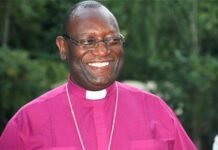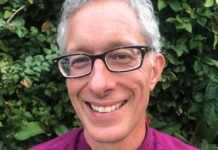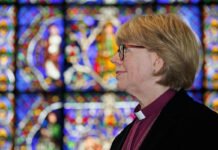Jesus Christ was crucified because he was feared to be a political revolutionary, a controversial openly gay Episcopal Church bishop preached at a worship service of a formerly large, traditionalist parish outside of Washington, D.C.
“Jesus was not crucified because he preached ‘love thy neighbor as thyself,’ he was crucified by the Romans because he was a threat to their political structure,” retired Episcopal Church Bishop Gene Robinson preached at The Falls Church Episcopal (TFCE) in Falls Church, Virginia on Sunday, October 30. “He could have easily led a revolution against the government.”
The former bishop of the Episcopal Diocese of New Hampshire forcefully argued for the centrality of political action within the life of the church, reciting a litany of policies favored by the political Left as the correct application of biblical justice. He also highlighted gratitude for an invitation to speak at a parish that had prominently opposed his election and consecration.
“Words fail me when I try to describe to you what an honor it is to be here,” Robinson exclaimed. “When I got this invitation from [TFCE Rector] Burl [Salmon] I could hardly believe my ears and all day yesterday. When I was here, I just kept pinching myself: ‘you’re actually at the Falls Church in Virginia, oh my God.’”
“There is no greater figure identified with the struggle for justice for queer people of faith than Bishop Robinson, and his election and consecration as Bishop of New Hampshire in 2003 was the deciding factor for some Episcopalians, unhappy with the broadening inclusion of this tradition, to break away from the church and affiliate with bodies outside the Anglican Communion. The Falls Church was one of those parishes,” Salmon wrote to parishioners in advance of Robinson’s visit.
The majority of members of The Falls Church departed the historic property in 2012 following a court decision to award ownership of the disputed buildings and parish financial accounts to the Episcopal Church. Those former Episcopalians argued that election and consecration of a bishop in a same-sex partnership was a presenting issue for deeper disagreement about the authority of scripture and the identity of Jesus as the unique Son of God. The Falls Church Anglican completed a new campus in 2019 and is a parish of the Anglican Church in North America.
‘Raging Streams of Injustice’
Robinson processed on Sunday morning past rows of empty pews in a sanctuary built to seat 800 for what was once among the most-attended parishes in the Episcopal Church.
In noting the morning’s reading of Isaiah chapter 1, Robinson dismissed sexual “perversion” as a chief objection of the Old Testament prophet against the people of Sodom and Gomorrah, instead insisting that it was a lack of hospitality.
“Somebody had to work really hard to define it as having something to do with sexual perversion, because right in the text from Isaiah and reconfirmed in the Book of Ezekiel are these words: ‘this was the guilt of your sister Sodom: this was the guilt she and her daughters had pride, excess of food, and prosperous ease but did not aid the poor and needy.’ I’m guessing that describes a lot of us, so welcome to the world of sodomites,” Robinson interpreted. “God found that worthy of destruction. That’s why Sodom and Gomorrah were destroyed.”
Robinson pivoted to focus on Isaiah’s words to seek justice and correct oppression.
“Justice, you see, is systemic work,” Robinson preached. “There are lots of raging streams of injustice.”
“Well now we’ve crossed the line haven’t we? We’ve brought politics into church. I don’t know a single clergy person who has not been criticized for bringing politics into the church, but here’s the truth: justice work is politics. How we treat one another, our fellow citizens, is politics and it’s part of being Christ-like,” Robinson declared. “We’re either fighting injustice or we’re collaborating with it.”
Robinson additionally spoke at a forum the morning of Saturday, October 29, recounting his experience as the first openly partnered gay man elected to be a bishop in the Episcopal Church and the worldwide Anglican Communion. A Washington Post reporter dutifully provided coverage of the Saturday forum but struggled to find a newsworthy angle as “Bishop Gene Robinson stood before dozens” recounting events now nearly two decades past.
Robinson and his husband divorced in 2014. The denomination has shrunk from a high of 3.6 million adherents in the mid-1960s to 1.5 million today, with attendance having plummeted to 458,179 in 2020. In Robinson’s New Hampshire diocese alone, he witnessed a nearly 20 percent drop in membership during his nine-year tenure — outpacing the church’s national decline.
Robinson served as a Senior Fellow at the liberal think tank Center for American Progress following his retirement. During his Sunday morning sermon, he upheld his own small parish, St. Thomas Dupont Circle in Washington, D.C., which has a chapel named in honor of him, as a model for biblical justice.
“On Saturdays we greet the busloads of migrants shipped to us by the governor of Texas [Greg Abbott] in hopes to shame us into changing the immigration laws.”
Robinson claimed that racism “haunts our entire society” and that “democracy is so on the line and in such jeopardy.” He urged “disavowing what can only be described as white Christian nationalism” and “fighting your [Virginia] Governor [Glenn Youngkin]’s attempts to lessen the protections for transgender kids.”
Cash Crunch
It remained unclear what more TFCE could potentially do in order to distance itself from those who chose to depart the Episcopal Church. The congregation hosted the first ordination service of an openly gay priest by the Episcopal Diocese of Virginia in 2012 and in 2014 the blessing of a same-sex union. In 2020, the congregation welcomed its first priest in a same-sex marriage to serve as an associate rector, and in 2021 called its first rector in a same-sex marriage. All current clergy at TFCE identify as gay, and Salmon has sought to form an LGBTQ outreach called the Queer Faithful. Progress flags (a variation of the pride flag) have been placed on the parish signage alongside the Black Lives Matter logo. Salmon serves as chair of the Clergy Advocacy Board of the Planned Parenthood Federation of America.
Financial challenges became more pronounced at TFCE in the past year. The church reduced two staff positions, including the parish administrator, to half-time while slashing its outreach budget and diocesan contribution.
“We simply have reduced giving,” Salmon told the congregation on July 24. “The markets have been difficult.”
As a parish, TFCE previously pledged approximately 8 percent of “plate and pledge” revenue to the Episcopal Diocese of Virginia. The longtime Director of Music announced her resignation soon after that position was scaled back.
“The fundamental core of our imbalance is that we spend over $900,000 on staffing and administration compared to total giving of around $600,000,” TFCE Treasurer James Weatherly told parishioners at the July worship service.
“Our pledge revenue is well below budget,” Salmon wrote the congregation in a July 28 e-mail newsletter. “The parish must make adjustments in expenditures.”
The parish has operated in the red for the past decade, approving a $280,000 deficit for the 2022 budget. That recurring deficit is offset by the Dayspring Fund, money that was in the accounts of The Falls Church at the time of the parish split and was awarded by court action to the Episcopal Diocese at the conclusion of litigation. Much of those funds had been raised as part of a capital campaign suspended in 2003 for the construction of an education and family ministries wing planned for the Southgate property across East Fairfax Street from the church.
Those Southgate properties have since been converted to commercial space in cooperation with a real estate developer. Since assuming control of the downtown Falls Church campus, the Episcopal congregation rebuilt from approximately 165 attendees in 2013 to a reported average Sunday attendance of 354 in 2020. The pre-split congregation’s average attendance was nearly 1,700 with an annual budget of approximately $5 million (Falls Church Anglican has an operating budget of $7.45 million).
“There is some greater thing at work in the cosmos,” Salmon wrote to parishioners. “As a person of faith who has seen Her immense power, I have come to understand that thing at work is the Holy Spirit, alive and unpredictable and capable of the impossible.”
“God makes all things new, and the Holy Spirit has been at work in The Falls Church to build a community defined by radical welcome,” Salmon continued. “Give praise to the Holy Spirit, who has brought the Bishop and The Falls Church together at last. God is indeed doing a new thing!”



